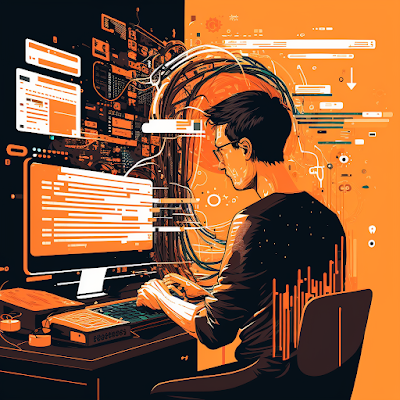Defining Automation and AI
Automation refers to the use of technology to perform tasks without human intervention. In the context of IT support, this could include automated ticket management, remote access solutions, and network monitoring tools. AI, on the other hand, involves the use of algorithms and machine learning to create intelligent systems that can make decisions, learn from data, and interact with humans. Examples of AI tools in IT support include intelligent virtual assistants, machine learning algorithms, and natural language processing.
The Importance of IT Support for Businesses
IT support is crucial for businesses of all sizes to ensure that their systems are running smoothly and any issues are resolved promptly. A reliable IT support team can help minimize downtime, prevent security breaches, and improve overall productivity. With the rise of remote work and digital transformation, IT support has become even more important to ensure that employees have access to the tools and resources they need to do their jobs effectively.
The Role of Automation in IT Support
Benefits of Automation for IT Support
Automation offers several benefits for IT support teams, including increased efficiency and speed, 24/7 availability, cost-effectiveness, and consistency and accuracy. By automating repetitive tasks, IT support professionals can focus on higher-value tasks that require human expertise, such as complex problem-solving and customer interactions. Some examples of automation tools in IT support include ticket management systems, network monitoring tools, and remote access solutions.
Examples of Automation Tools in IT Support
Ticket management systems are used to track and manage customer support requests, ensuring that all issues are addressed promptly and efficiently. Network monitoring tools can detect issues with servers, network devices, and applications, allowing IT support professionals to resolve problems before they impact users. Remote access solutions enable IT support teams to access users' devices remotely, providing faster and more efficient support.
Improving Customer Service with Automation
Automated chatbots, email responses, and password resets are just a few examples of how automation can improve customer service in IT support. Chatbots can handle routine inquiries and provide basic support, freeing up IT support professionals to focus on more complex issues. Automated email responses can acknowledge receipt of a support request and provide an estimated timeframe for resolution. Automated password resets can help users quickly regain access to their accounts without the need for human intervention.
The Role of AI in IT Support
Benefits of AI for IT Support
AI offers several benefits for IT support teams, including predictive maintenance, proactive support, and personalized customer experiences. By analyzing data from various sources, AI can predict and prevent potential issues before they occur. Proactive support involves using AI to identify patterns and trends in support requests, allowing IT support teams to address issues before they become widespread. Personalized customer experiences can be achieved through the use of AI-powered chatbots, which can provide tailored recommendations and support based on the user's history and preferences.
Examples of AI Tools in IT Support
Intelligent virtual assistants, machine learning algorithms, and natural language processing are just a few examples of AI tools that can be used in IT support. Intelligent virtual assistants can handle routine inquiries and provide personalized support based on the user's history and preferences. Machine learning algorithms can analyze data to identify patterns and trends, allowing IT support teams to make informed decisions about how to allocate resources. Natural language processing enables AI-powered chatbots to understand and respond to user queries in a natural and intuitive way.
Improving Customer Service with AI
AI can improve customer service in IT support by providing automated personalization, predictive analytics, and omnichannel support. Automated personalization involves using AI to tailor support based on the user's history and preferences. Predictive analytics can be used to identify potential issues before they occur and proactively address them. Omnichannel support involves providing support across multiple channels, such as email, chat, and social media.
The Impact of Automation and AI on IT Support
Changes in Job Responsibilities for IT Support Professionals
With the introduction of automation and AI, the role of IT support professionals has changed. They are no longer responsible for carrying out repetitive and mundane tasks. Instead, they focus on high-value tasks that require human skills, such as problem-solving and critical thinking. This change in job responsibilities has led to the development of new skills and has opened up new career opportunities for IT support professionals.
Improved Efficiency and Productivity
Automation and AI have helped IT support teams to be more efficient and productive. By automating routine tasks, IT support professionals can focus on complex tasks that require their expertise. This has led to faster issue resolution times and reduced downtime for businesses.
Enhancing Customer Service
Automation and AI have enhanced customer service by improving response times and increasing customer satisfaction. By automating routine tasks, IT support professionals can respond to customer requests faster, leading to a better customer experience. Additionally, AI-powered chatbots and virtual assistants can provide 24/7 customer support, further improving customer service.
Challenges and Limitations of Automation and AI in IT Support
Potential Challenges in Implementing Automation and AI
The implementation of automation and AI in IT support can face challenges. Resistance to change is a common issue, as some IT support professionals may fear losing their jobs to automation. Technical limitations can also pose a challenge, as not all tasks can be automated. Furthermore, current automation and AI technology have limitations, such as language and cultural barriers.
Lack of Human Touch
One of the limitations of automation and AI in IT support is the lack of human touch. While automation and AI can be efficient, they lack empathy and understanding. This can lead to a less personalized experience for customers, which can impact customer satisfaction.
Data Privacy and Security Concerns
The use of automation and AI in IT support can raise data privacy and security concerns. As these technologies handle sensitive data, businesses must ensure that they have proper security measures in place to protect customer information.
The Future of IT Support: A Holistic Approach
Integrating Automation and AI with Human Expertise
The future of IT support lies in integrating automation and AI with human expertise. By combining the efficiency of automation and AI with human skills, businesses can provide better customer service and improve their overall operations. Augmented intelligence and hybrid teams can help to achieve this goal.
A Holistic Approach to Customer Service and IT Support
A holistic approach to customer service and IT support is essential for businesses. This approach focuses on a customer-centric mindset and continuous improvement. By understanding the needs of customers and addressing them through a combination of automation, AI, and human expertise, businesses can create a better customer experience.
Conclusion
In conclusion, automation and AI are revolutionizing IT support and customer service. The benefits of automation and AI, such as improved efficiency and productivity, faster issue resolution, and enhanced customer service, are clear. However, challenges and limitations, such as resistance to change, technical limitations, and data privacy and security concerns, must be addressed. The future of IT support lies in a holistic approach that integrates automation, AI, and human expertise to create a better customer experience.









Post a Comment